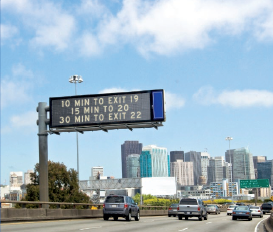Planning for Reliability Workshop
Printable version [PDF 671 KB]
You may need the Adobe® Reader® to view the PDFs on this page.
Contact Information: Operations Feedback at OperationsFeedback@dot.gov
Advancing Reliability through Operations
WORKSHOP DATE & TIME:
TBD
LOCATION:
TBD
COST:
FREE
Planning for reliability reduces unexpected delays and helps travelers reach their destination on time.
For information on hosting or
attending this workshop, contact:
Jim Hunt
FHWA Office of Operations
Jim.Hunt@dot.gov
Phone: (202) 680-2679
Travel time reliability is critical to many transportation system users, whether they are vehicle drivers, transit riders, freight shippers and carriers, or even air travelers. This workshop equips planners and operators to integrate reliability and operations into transportation planning using a performance-based approach. The workshop helps planners and operators elevate reliability as a system goal and performance measure and apply operations strategies to achieve reliability and other system goals. Participants will gain a deeper understanding of the concept of reliability and its measures. Small group exercises allow participants to apply what they have learned to realistic scenarios and leave the workshop with an action plan.
Benefits of Planning for Reliability
- Enables decisions based on a more accurate reflection of traveler experience. Planning based only on average travel time rather than accounting for how travel times may vary will miss a major part of the system performance story and likely miss solutions that would directly improve travel times and their predictability.
- Improves customer satisfaction. Most travelers are less tolerant of the unexpected and tend to remember the few bad days they spent in traffic rather than their average travel time throughout the year. Unreliable travel times penalize travelers with either unexpected delays or unproductive "padding" of their travel time to avoid being late.
- Elevates consideration of lower cost operational strategies. Travel time reliability better quantifies the benefits of traffic management and operations activities than average travel times.
- Improves safety. Addressing causes of unreliability, such as traffic incidents through improved incident management, can reduce secondary crashes and congestion-related crashes.
- Increases economic benefits. Improving reliability increases productivity of travelers by enabling them to reduce "padding" of travel times due to possible delays. Shippers have lower business expenses and can maintain efficient supply chains for just-in-time delivery and manufacturing processes.
Who Should Attend?
The target audiences for the workshop are directors, transportation planners, and operations personnel from metropolitan planning organizations (MPOs); representatives from State DOTs, local governments, and transit agencies; and others involved in the planning process who are interested in integrating operations and reliability into the transportation planning process and other operations planning initiatives.
Core Workshop Content

Planning for Reliability
Travel time reliability can better represent a commuter's experience than average travel time.The workshop spans 1 to 2 days based on the needs of the agency. Topics covered in the core workshop include:
- Introduction to Travel Time Reliability and Operations
- Planning for Reliable System Performance – A Paradigm Shift
- Elements of Planning for Improved Reliability through Operations
- Identifying and Prioritizing Reliability Issues
- Identifying and Refining Operations Objectives and Performance Measures
- Analyzing and Selecting Strategies for Reliable Operations
- Programming and Funding for Operations
- Monitoring and Evaluating
Optional Modules
Host agencies can select modules to be added to the core workshop content. Available modules include:
- Incorporating Reliability Performance Measures into Goods Movement
- Data Considerations for Travel Time Reliability
- Applying Analysis Tools in Planning for Operations
- Benefit-Cost Analysis of Operational Strategies
- Developing a Regional Concept for Transportation Operations (RCTO)
- Supporting Livability and Sustainability with Operations
- Applying the Regional ITS Architecture to Support Planning
- Use of Archived Operations Data in Transportation Planning
- Advancing TSMO through Scenario Planning
- Integrating Business Processes to Improve Transportation System Performance
For information on hosting or attending this workshop, contact: Jim Hunt, FHWA Office of Operations, at Jim.Hunt@dot.gov or (202) 680-2679.
A related web-based course is available free from FHWA's National Highway Institute. OPM 03: Operations Performance Management is a 6-hour online course that provides participants with an understanding of how performance management is used to make cost-effective investment decisions that are geared toward meeting agency goals. It takes a broad management view of performance management, harnessing the power of performance measurement to improve management practice and closing the loop between strategic objectives and measured performance.
Register for this course at: https://www.nhi.fhwa.dot.gov/course-search?course_no=137059&sf=1.
U.S. Department of Transportation Planning for Operations Resources at: